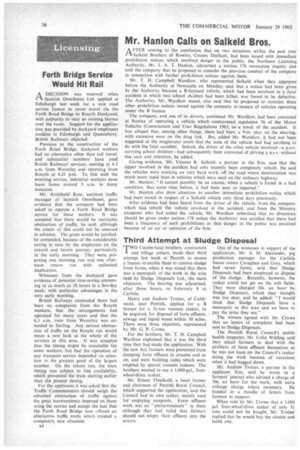Third Attempt at Sludge Disposal
Page 38

If you've noticed an error in this article please click here to report it so we can fix it.
TWO Cumberland brothers, contractors and village joiners, made their third attempt last week at Penrith to secure a licence to enable them to remove sludge from farms, when it was stated that there was a monopoly of the work in the area held by Sludge Disposals Ltd., the main objectors. The hearing was adjourned, after three hours, to February 8 at Carlisle.
Henry and Andrew Trotter, of Calthwaite, near Penrith. applied for a B licence for a 31-ton vacuum tanker, to be acquired, for disposal of farm effluent, sewage and liquid waste within 30 miles. There were three objectors, represented by Mr. G. P. Crowe.
For the brothers, Mr. T. H. Campbell Wardlaw explained that it was the third time they had made the application. With the new Act, farmers were prevented from dumping farm effluent in streams and so on, and were building tanks which were emptied by special vacuum tankers. The brothers wanted to use a 1,000-gal., fourwheel-drive tanker.
Mr. Ernest Threlkeld, a local farmer and chairman of Penrith Rural Council, which supported the application, said the Council had its own tanker, mainly used for emptying cesspools, Farm effluent work was an " embarrassment " to them although they had ruled that farmers should not empty their effluent into the sewers. One of the witnesses in support of the application, Mr. S. M. Alexander, pig production manager for the Carlisle bacon curers Cavaghan and Gray, which had seven farms, said that Sludge Disposals had been employed to dispose of the sludge. Recently, however, the tanker could not get on the soft fields. They were charged 50s. an hour by Sludge Disposals, which they thought was too dear, and he added: "I would think that Sludge Disposals have a monopoly in this area and we have to pay the price they say."
The witness agreed with Mr. Crowe that no letters of complaint had been sent to Sludge Disposals.
The Penrith Rural Council's public health inspector. Mr. Cohn Wilding, said they asked farmers to deal with the problem of farm effluent themselves as he was not keen on the Council's tanker doing the work because of occasions when it had bogged down.
Mr. Andrew Trotter, a partner in the applicant firm, said he wrote to a farmers' journal who advised a charge of 30s. an hour for the work, with extra mileage charge where necessary. He handed in a bundle of letters from farmers in support.
When told by Mr. Crowe that a 1,000 gal, four-wheel-drive tanker of only 31 tons could not be bought, Mr. Trotter replied that he would buy the chassis and build one.




















































































































